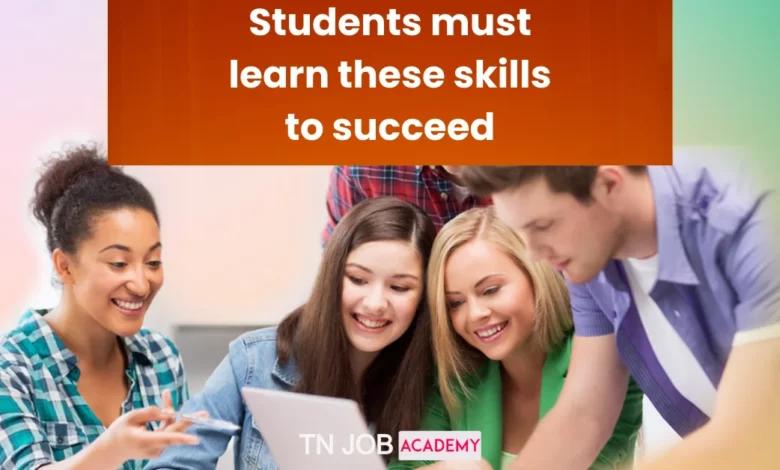
Students must learn these skills in order to succeed in future challenges. Teachers constantly work to get students ready for the “real world” that surrounds them. They are given instruction in math, reading, and writing. Then there are, of course, the less obvious abilities we impart, like teamwork, critical thinking, and curiosity about the things they come into contact with on a daily basis.
When they leave us and reach adulthood, we want to have prepared them to live fulfill lives. But what does the future hold for our students? Did teachers twenty years ago anticipate that our world would be so dependent on technology and computers today? Could they have predicted the skills in demand in the modern job market? Although unlikely, they had to make every effort to get their students ready for the real world. The challenging task of preparing students for the future remains the responsibility of educators today.
Tony Wagner of Harvard University conducted research to identify the seven survival skills needed in the twenty-first century. To do this, hundreds of CEOs from for-profit companies, educational institutions, and businesses were questioned. From their responses, a list of seven abilities that people will need to succeed in the 21st century was created.
Although we may not be able to predict exactly what our students’ futures hold, we do have the advantage of knowing the skills they will require when they get there. The seven 21st-century survival skills are listed below, along with an example of how they might be used in a classroom.
Emirates ID Status Online Checking 2022: Step by Step Procedure
Critical thinking and problem solving
Groundwork: Students will need to hone their abilities to formulate their own solutions and look at problems from various perspectives. No matter what industry they decide to work in, quick thinking and decision-making skills are essential for success in the future. To help them practice this, teachers should put students in situations where they must solve problems on their own. These are circumstances where they can use the skills, they have already acquired to solve a problem.
Since we don’t want to teach students that there is only one solution, but rather that problem-solving can be a creative and individual experience, the problem should ideally lend itself to multiple solutions. Mathematical situational problems are a good way to see these abilities in action.
Leading by influence and collaborating across networks
Groundwork: realizing that not everyone is naturally a leader.
However, the capacity to lead others can unquestionably aid someone in developing and succeeding in their chosen career. Additionally, it can be challenging to find a job where you don’t need to be able to collaborate well with others. More than just the usual teamwork is needed to best prepare students in this area. Students should be encouraged to assume different roles within their group for each task within the project rather than just forming a group and splitting the tasks amongst one another.
They may occasionally serve as the “manager,” while other times they may serve as a “organiser” or “graphic designer.” Students can participate in a variety of roles during a project with their peers, which enables them to work with others more collaboratively than simply disassembling a project and putting it back together at the end.
Agility and adaptability
Groundwork: We can see how much the world and the workplace have changed if we look back on the past 20 years.
The ability to accept change and the willingness to change with it are qualities that we need from our students. The classroom environment that teachers can create can help students get ready for the future. Students can learn to adapt by being exposed to a variety of teaching methods, classroom setups, student learning demonstrations, and even the rules for group projects or homework.
For instance, after having them develop a plot, surprise them with a necessary component they must include. You could even have them switch tasks and finish one another’s preparations. They might complain at first, but the abilities will be very useful to them!
GAMCA Online Appointment | GAMCA Approved Medical centres in Chennai & Trichy
Initiative and entrepreneurship
Groundwork: Students must be capable of initiative and contribution to society. In both our communities and our classrooms, we ought to promote these abilities. We can ask our students for much more than just a list of rules and consequences for breaking them because they are often very imaginative and eager to shape their classroom experience.
Inform them that you are available and ready to consider any suggestions they may have for enhancing the classroom or school. Even if an idea doesn’t work out, assist them in organizing and implementing their ideas. It can teach us how to evaluate what went wrong and think of ways to make the idea better. Never let a student’s fear of failing prevent them from trying.
Oral and written communication that works
Groundwork: Although technology changes, the value of these skills remains constant. Consider a manager or boss who sends you a grammatically incorrect email or who delivers a new business plan while speaking too softly and reading the entire presentation aloud. What would you genuinely believe? What distinguishes the best communicators you have seen from the competition? Our students must learn how to speak clearly and with assurance.
Enunciation, speed, volume, gestures, and eye contact cannot be taught or learned; they must all be practiced. In oral communication, the same abilities that are useful in drama can be helpful. Try starting a lesson one day in a very ineffective way, and then watch how long it takes your students to ask you what you’re doing. They ought to be able to pinpoint precisely what’s “wrong” with your communication abilities for you!
Regarding written communication, we must continue to stress the guidelines while also instructing students on how to use the technology at their disposal to edit their writing. It’s crucial for students must learn and begin using the distinction between formal and informal writing.
Information Analysis and Access
Groundwork: Today’s students have access to an enormous amount of knowledge. They can use the Internet as a fantastic research tool or as their worst enemy. Information is readily available but finding reliable information can be challenging. Students must learn how to navigate the millions of web pages available on a subject to find what they’re looking for (and be able to trust what they find). They must be taught the distinction between actual facts and opinions that have the appearance of being true.
Today, many students look up information on “answer” websites without really considering how the information was created by someone who may or may not be accurate or truly knowledgeable in a subject area. We can think aloud Internet searching strategies in the same way that a teacher can “think-aloud” reading strategies. Learn with your students about a subject by projecting your screen onto the board. Show them how to use those “answer” sites safely and how to conduct searches!
Curiosity and creativity
Groundwork: Our students approach us with a natural curiosity and desire to learn more about their surroundings. They come up with an endless supply of useful and useless things thanks to their wild and untamed imaginations. Our job as educators is less about showing them how to be inquisitive and imaginative and more about preserving that in them. We must continue to support them in acquiring these abilities and instruct them on how to use them in original and constructive ways. Think of the young boy who despises princesses but adores robots and soldiers.
How do you respond when he presents you with a freshly-drawn illustration of a soldier destroying a princess with a weapon inspired by a robot? Do you honor his creativity the same way you honor the robot the student next to him drew to save the world? Is his portrait affixed to the wall?
We don’t all share the same tastes and values, so educators need to be very careful about how they encourage and develop their students’ imagination and creativity. Without making them feel as though their ideas are flawed or inadequate, we can teach them what actions to take in which circumstances.




